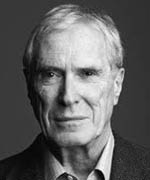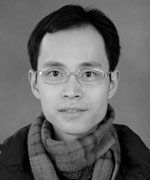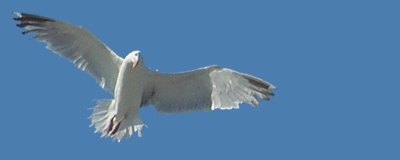
Mark Strand
马克-斯特兰德
  Mark Strand was born on Prince Edward Island, Canada, in 1934. He spent his youth mostly in South and North America. In 1964 he published his first book of poetry, Sleeping with One Eye Open. His subsequent works include: Darker (1970); The Story of Our Lives (1973); The Later Hour (1978); Selected Poems (1980); The Continuous Life (1990); Blizzard of One (1998); Man and Camel (2006). He has served as Poet Laureate of the United States from 1990 to 1991. Mark Strand was born on Prince Edward Island, Canada, in 1934. He spent his youth mostly in South and North America. In 1964 he published his first book of poetry, Sleeping with One Eye Open. His subsequent works include: Darker (1970); The Story of Our Lives (1973); The Later Hour (1978); Selected Poems (1980); The Continuous Life (1990); Blizzard of One (1998); Man and Camel (2006). He has served as Poet Laureate of the United States from 1990 to 1991.
马克-斯特兰德于1934年出生于加拿大的爱德华王子岛,在南美和北美度过青年时代。1964年出版第一本诗集《睁一只眼睡觉》,随后的作品包括:《更暗》(1970);《我们生活的故事》(1973);《晚间时刻》(1978);《诗选》(1980);《持续的生活》(1990);《一场暴风雪》(1998);《人与骆驼》(2006)。斯特兰德于1990-91年间任美国桂冠诗人。
|

|

译者
Translator
冯冬
Peter Feng
 
冯冬,1979年生于重庆,当过大学英文教师,南京大学英文博士班学生,曾译过游记《中华帝国纪行》、《亲密接触中国》、小说《蛛网与磐石》、诗歌《西米克的诗》等,在《新大陆》等诗刊上发表过作品,主要研究诗歌、精神分析和当代哲学。
Peter Feng was born in Chongqing, China, in 1979. He taught English at a Chinese college for two years. He is currently a PhD student at Nanjing University. He has co-translated a travelogue A Journey through the Chinese Empire, Intimate China, a novel The Web and the Rock and a book of translation Poems of Charles Simic. His poems appeared in Chinese poetry journal New World Poetry Bimonthly and others. His study includes poetry, psychoanalysis, and contemporary philosophy.
|
It was an adventure much could be made of: a walk
On the shores of the darkest known river,
Among the hooded, shoving crowds, by steaming rocks
And rows of ruined huts half buried in the muck;
Then to the great court with its marble yard
Whose emptiness gave him the creeps, and to sit there
In the sunken silence of the place and speak
Of what he had lost, what he still possessed of his loss,
And, then, pulling out all the stops, describing her eyes,
Her forehead where the golden light of evening spread,
The curve of her neck, the slope of her shoulders, everything
Down to her thighs and calves, letting the words come,
As if lifted from sleep, to drift upstream,
Against the water's will, where all the condemned
And pointless labor, stunned by his voice's cadence,
Would come to a halt, and even the crazed, disheveled
Furies, for the first time, would weep, and the soot-filled
Air would clear just enough for her, the lost bride,
To step through the image of herself and be seen in the light.
As everyone knows, this was the first great poem,
Which was followed by days of sitting around
In the houses of friends, with his head back, his eyes
Closed, trying to will her return, but finding
Only himself, again and again, trapped
In the chill of his loss, and, finally,
Without a word, taking off to wander the hills
Outside of town, where he stayed until he had shaken
The image of love and put in its place the world
As he wished it would be, urging its shape and measure
Into speech of such newness that the world was swayed,
And trees suddenly appeared in the bare place
Where he spoke and lifted their limbs and swept
The tender grass with the gowns of their shade,
And stones, weightless for once, came and set themselves there,
And small animals lay in the miraculous fields of grain
And aisles of corn, and slept. The voice of light
Had come forth from the body of fire, and each thing
Rose from its depths and shone as it never had.
And that was the second great poem,
Which no one recalls anymore. The third and greatest
Came into the world as the world, out of the unsayable,
Invisible source of all longing to be; it came
As things come that will perish, to be seen or heard
Awhile, like the coating of frost or the movement
Of wind, and then no more; it came in the middle of sleep
Like a door to the infinite, and, circled by flame,
Came again at the moment of waking, and, sometimes,
Remote and small, it came as a vision with trees
By a weaving stream, brushing the bank
With their violet shade, with somebody’s limbs
Scattered among the matted, mildewed leaves nearby,
With his severed head rolling under the waves,
Breaking the shifting columns of light into a swirl
Of slivers and flecks; it came in a language
Untouched by pity, in lines, lavish and dark,
Where death is reborn and sent into the world as a gift,
So the future, with no voice of its own, nor hope
Of ever becoming more than it will be, might mourn.
|
|
这是一场意义重大的历险:行走于
最黑暗的河的岸边,
走在戴头巾的拥挤的人群里,冒热气的岩石,
一排排半埋于污泥的荒废的小屋;
然后来到巨大的宫殿,大理石庭院的
空荡令他毛骨悚然,他坐在
那下沉的缄默中,述说
他所丧失的,在丧失中仍拥有的,
然后,取下所有的琴塞,描述她的眼睛,
她那沐浴于傍晚金光中的额头,
她颈子的曲线,她肩膀的倾斜,向下
直到她的大腿,小腿,让词语到来,
仿佛从睡梦中升起,逆着流水的意志
向上游漂浮,所有被诅咒的
无意义的劳作,惊讶于他声音的节奏,
都停下来,连披散头发的疯狂的
复仇女神,也破天荒地哭泣,充满煤灰的
空气稍变清晰,足以让失落的新娘
走出自己的形象,在光芒里现身。
众所周知,这是第一首伟大的诗,
接下来许多天,他坐在
朋友们的屋子里,头朝后望,双眼
紧闭,试图用意志将她带回,但
一再发现惟有他自己,陷入
丧失的寒冷,最后,
他一句话不说,离开去城外的
山间游荡,直到他震动了
爱的形象,用他期望的世界的模样
代替它,急切地将它的形状与尺度
注入令世界动摇的全新的语言,
他一开口,树突然出现于光秃之地,
抬起它们的枝条,用它们
幽暗的衣袍拂过嫩草,
轻飘的石头走来安置在那里,
小动物躺在奇妙的谷地
与玉米的过道里睡觉。光的声音
从火的身体里出来,各种事物
从各自的深度升起,前所未有地放光。
这是第二首伟大的诗,
再无人记得。第三首,最伟大的一首,
从那无法言说的,进入作为世界的世界,
一切渴望的看不见的源头;它如同
会消逝的事物一样到来,一度被听见,
看见,如一层霜冻或风的吹动,
消失无踪;它在睡梦中到来,
像一扇通向无限的门,被火焰环绕,
在醒来时再次到来,有时,
它仿佛蜿蜒的河边的树,遥远,渺茫,
树的紫色阴影轻触岸边,
附近丛密的腐烂的落叶间
散落着某个人的肢体,
他那割下的头在波浪下翻滚,
将移动的光柱打碎成银斑的漩涡;
它以毫无怜悯的语言到来,
奢侈的黑暗的诗行,
死亡得以重生,被当做礼物送入世界,
于是未来,没有自己的声音,也无望
超越它将成为的,可以哀悼。
|







